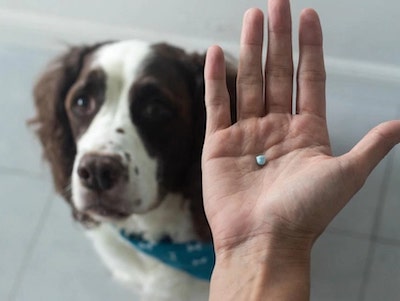As responsible and caring guardians of our furry companions, it’s natural to want to provide them with relief when they’re in pain. However, when it comes to certain medications like Naproxen, it’s crucial to understand the potential risks and dangers associated with their use in dogs.
In this article, we will delve into the topic of Naproxen and its suitability for canine consumption. We’ll explore the reasons why Naproxen should never be given to dogs and discuss alternative approaches to managing their pain effectively and safely.
So, if you’ve ever wondered about the safety of giving Naproxen to your beloved four-legged friend, keep reading to find the answers you need to ensure their well-being.
What is Naproxen?
Naproxen is a non-steroidal anti-inflammatory drug (NSAID) that works by blocking the production of prostaglandins, which are chemicals that cause inflammation and pain in the body.
Naproxen is used to treat various conditions in humans such as arthritis, gout, menstrual cramps, headache, toothache and muscle pain.

Naproxen comes in different forms such as tablets, capsules and liquid, and it is available in immediate and delayed release formulations.
Why Naproxen is Not Safe for Dogs
While naproxen may be effective for humans, it is not suitable for dogs for several reasons. First of all, naproxen has a very narrow margin of safety in dogs, meaning that even a small dose can be toxic.
According to PetMD, the toxic dose of naproxen for dogs is as low as 5 mg per kg of body weight. To put this in perspective, a single tablet of Aleve® contains 220 mg of naproxen, which can be lethal for a dog weighing less than 10 kg.
Secondly, naproxen has a long half-life in dogs, meaning that it stays in their system for a long time. According to PetPlace, the half-life of naproxen in dogs is about 72 hours, compared to only 12 to 17 hours in humans. This means that naproxen can accumulate in the dog’s body and cause more damage over time.
Thirdly, naproxen can interfere with other medications that your dog may be taking, such as other NSAIDs, steroids, blood thinners, diuretics, and antibiotics. Naproxen can also worsen some medical conditions that your dog may have, such as kidney disease, liver disease, blood disorders, or heart failure.
Symptoms of Naproxen Toxicity in Dogs
If your dog accidentally ingests naproxen or you give it to them without consulting your veterinarian, they may develop signs and symptoms of naproxen toxicity within a few hours or days. These include:

- Loss of appetite
- Vomiting
- Diarrhea
- Black, tarry stools
- Abdominal pain
- Dehydration
- Lethargy
- Weakness
- Pale gums
- Anemia
- Bleeding disorders
- Liver damage
- Kidney damage
- Ulcers in the digestive tract
- Seizures
- Coma
- Death
Naproxen toxicity in dogs is a medical emergency and requires immediate veterinary attention. If you suspect that your dog has ingested naproxen or is showing any of these signs, call your veterinarian or an animal poison control center right away. Do not try to induce vomiting or give any home remedies without consulting a professional.
What to Do If Your Dog Ingests Naproxen?
The treatment for naproxen toxicity in dogs depends on the amount ingested, the time elapsed since ingestion, and the severity of the symptoms. Your veterinarian may perform some tests to assess your dog’s condition, such as blood work, urine analysis, abdominal x-rays, or endoscopy. They may also administer some treatments to counteract the effects of naproxen, such as:

- Activated charcoal to bind the drug and prevent further absorption
- Fluid therapy to correct dehydration and electrolyte imbalances
- Anti-emetics to control vomiting
- Gastric protectants to prevent or heal ulcers
- Blood transfusions to treat anemia or bleeding disorders
- Anticonvulsants to control seizures
- Dialysis to remove the drug from the blood stream
- Liver or kidney support medications to prevent or treat organ damage
The prognosis for naproxen toxicity in dogs depends on the amount ingested, the time elapsed since ingestion, and the response to treatment. Some dogs may recover fully with prompt and aggressive treatment, while others may suffer from permanent organ damage or death.
Alternatives to Naproxen for Dogs
If your dog is in pain, you should not give them any human medications without consulting your veterinarian first. There are other safer and more effective pain relievers for dogs that your veterinarian can prescribe depending on the cause and severity of your dog’s pain. Some examples are:
- Carprofen (Rimadyl): This is a NSAID that is approved for use in dogs. It can help with pain and inflammation caused by arthritis, surgery or injury. It has fewer side effects than naproxen but still requires regular blood tests and monitoring.
- Meloxicam (Metacam): This is another NSAID that is approved for use in dogs. It can also help with pain and inflammation caused by arthritis, surgery or injury. It has fewer side effects than naproxen but still requires regular blood tests and monitoring.

- Tramadol (Ultram): This is an opioid analgesic that can help with moderate to severe pain in dogs. It works by binding to opioid receptors in the brain and spinal cord. It has fewer side effects than NSAIDs but can cause sedation, nausea or constipation.
- Gabapentin (Neurontin): This is an anticonvulsant drug that can help with neuropathic pain in dogs. Neuropathic pain is caused by damage to the nerves or spinal cord. It works by reducing the activity of nerve signals. It has fewer side effects than NSAIDs but can cause drowsiness, ataxia or loss of coordination.
- Buprenorphine (Buprenex): This is another opioid analgesic that can help with severe pain in dogs. It works by binding to opioid receptors in the brain and spinal cord. It has fewer side effects than NSAIDs but can cause sedation, nausea or constipation.
These medications have different dosages, side effects and interactions that you should discuss with your veterinarian before giving them to your dog. You should also follow your veterinarian’s instructions on how to administer, store and dispose of these medications safely.
FAQs
Can I give my dog over-the-counter pain medications that contain Naproxen?
No, over-the-counter pain medications containing Naproxen, such as Aleve, should never be given to dogs. Always consult your veterinarian before administering any medication to your dog, as some seemingly harmless human medications can be dangerous or even fatal to them.
Can I give my dog any human medications for pain relief?
No, it is crucial to never give your dog any human medications without explicit veterinary approval. Many medications that are safe for humans can be toxic to dogs due to differences in metabolism and physiology. Always consult your veterinarian for guidance on suitable medications for your dog’s pain relief.
How can I ensure my dog’s overall well-being and prevent the need for pain medications?
Maintaining a healthy lifestyle for your dog is essential in preventing the need for pain medications. This includes providing a balanced diet, regular exercise, routine veterinary care, and monitoring their well-being closely. Early detection of health issues and proactive management can help minimize the need for pain medications in the first place.
Where can I find more information on safe pain management for dogs?
Your veterinarian is the best source of information on safe pain management for dogs. They can provide specific guidance based on your dog’s health, condition, and individual needs. Always consult with them for reliable and accurate information regarding your dog’s well-being.
Final Thoughts
In conclusion, the question of whether you can give your dog Naproxen has a resounding answer: No. Naproxen is not safe for canine consumption and can have severe consequences on their health. It’s crucial to prioritize the well-being of our furry friends and seek safe alternatives for pain relief under the guidance of a veterinarian.
While it may be tempting to administer human medications to our dogs in an effort to alleviate their discomfort, it’s essential to remember that their physiology differs from ours, and what may be harmless to us can be toxic to them. The potential risks, such as gastrointestinal ulcers, kidney damage, and liver toxicity, make it imperative to exercise caution and consult a professional.

Robert is the heart of Dog Needs Best, with his cheerful personality he is not only beloved by our team but also by dogs. He owns multiple dogs and knows ins and outs of them. Finding the perfect product is what he is best at!

